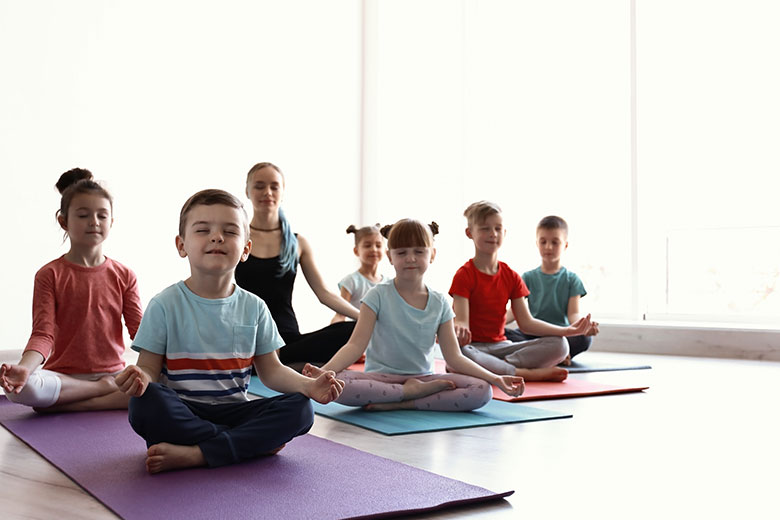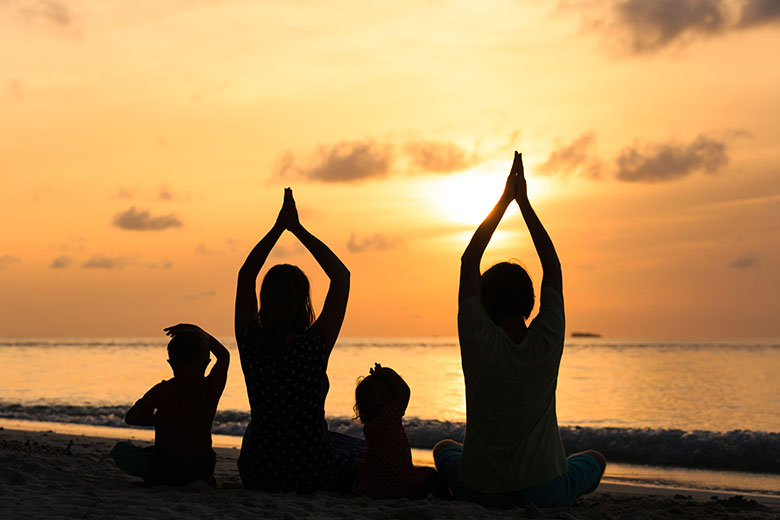There are thousands of studies showing the positive impact of meditation on our health and wellbeing. And these fantastic benefits aren’t just for adults! Meditation is the key to raising children with a sense of focus and happiness. It can alleviate stress, anxiety, frustration, fear, anger, restlessness, and many more symptoms youngsters suffer from in the increasingly hectic world in which we now live.
With regular practice, children show signs of being calmer, better focused, and with more enhanced creativity and concentration. Children with behavioural issues benefit from daily meditation.
Change Your Thoughts, Change Your World
Meditation is a continual process of training your mind to focus and redirect your thoughts. A few benefits of meditating as validated by scientific research include increased self-awareness, concentration, self-esteem, creativity, and calmness.
Awareness
By looking inside of themselves, children discover what they’re passionate about and what they would like to do in life. They begin to understand how they react and why they react, and learn how to better respond in challenging situations. Through meditation, young people can also develop a level of independence where they follow their intuition instead of just following the crowd.
Concentration
Learning how to focus and concentrate is at the heart of meditation, helping children to read, study and learn much more effectively. Teachers have reported considerably less hyperactive behaviour, ADHD symptoms, and inattentiveness in their students when they mediate regularly.
Self-Esteem
Meditation helps youngsters to learn how to pay attention to their thoughts, feelings and emotions. In doing so, they can be more empathetic and more compassionate toward others. They even become better listeners.
Creativity
All children are naturally curious and creative, and mediation can fine-tune these abilities. Psychologists at Leiden University in the Netherlands, for instance, found that, after doing short meditation exercises, participants performed better on tasks that required them to produce fresh creative ideas.
Calmness
Modern technology is a boon and sometimes a curse. Children are especially predisposed to the side effects of too much technology, such as shorter attention span, less patience and anxiety. It’s essential to offset all this exposure to technology with some quiet time, and meditation is the perfect complement. In a British study across 15 schools, where 96% of students had low relaxation levels or high hyperactivity, 85% of students reported feeling calmer and more relaxed after practising meditation.
It’s Not All in the Mind
The benefits of meditation are not only ‘in the mind’ either. It can also change the body in surprising ways. Studies have shown, for example, that mediation has a direct influence on the way our hormones are released and regulated. And when we meditate, our mind impacts the body on a cellular level, helping to regenerate and balance the body by regulating the endocrine system.
Meditation has also been shown to regulate parts of our nervous system directly. Indirectly it even helps to control our blood pressure to some extent. Various researchers point out that meditation practices are effective in assisting in the prevention and mitigation of heart diseases.

All children are naturally curious and creative, and meditation can fine-tune these abilities
Other benefits include:
- Reduces pain: a 2016 study found that meditation significantly reduces the intensity of pain in the body
- Reduces inflammation: a study at the University of Wisconsin – Madison, found that meditation changes the genes acting upon cellular structure in the body, reducing inflammation
- Helps asthma symptoms: a meta-analysis published in August 2017 in the Journal of Asthma found significant evidence to suggest meditation increases quality of life in people with asthma, as well as helping relieve symptoms
How to Begin
The fact is that so much of what parents want for their children is accessible through meditation – the impact on young people can quite literally be life-changing! But how does a child begin to learn how to meditate? Children learn best with a facilitator or guide. The personal touch allows them to connect better with this practice and lays the foundation of a beautiful habit that they can carry into their adulthood.
Books and DVDs can be additional support for them and their parents, as families that meditate together receive immense benefits.
They should begin with just five or so minutes every day. It’s not easy for them in the beginning, but with regular practice, they can increase the duration. The easy ones, to begin with, are deep breathing, a few simple Pranayama techniques, chanting mantras, candle meditation, sound bowl and gong meditation, or meditating with crystals. Children respond better with sensory support.
Youngsters should practice meditation first thing in the morning before they begin their day, and in the evening once they start to unwind from the day’s exertions. And guided meditations can help enormously as they allow children to follow a script that lets them explore their imagination, without losing their way. The facilitator subtly guides them through the experience to achieve the target of the topic of the meditation.
Meditation can change your life and even a sense of who you are. There is a reason it has been around for thousands of years and practised by people from all walks of life and in every corner of the world. But how do children know if they are doing it ‘properly’? Well, they are successfully meditating if they meditate; it’s not rocket science. Simply taking a moment to discover what is going on inside their own minds, without engaging in any kind of dialogue, is all that is required. The result of this observation is the beginning of an extraordinary and magnificent journey!


